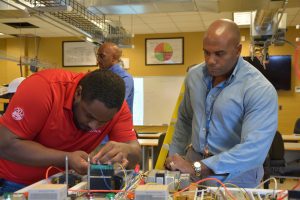By: Felipe Rivas

2 min read August 2020 — For the better part of the last decade, the Peach State has consistently ranked as the best state to do business year after year, a feat largely driven by Georgia’s robust higher education institutions and the state-funded technical college system. The Technical College System of Georgia (TCSG) is the state government agency overseeing Georgia’s 22 technical colleges. As the country slides into a pandemic-led recession, the system remains keen on solidifying Georgia’s workforce, while helping companies land the talent needed to thrive in a volatile economy.
Georgia’s track record for attracting new industries and companies is largely a result of the state’s pro-business landscape, geographical location and proximity to other key markets, and efforts to nurture a market-ready workforce. The system’s mission is to build a well-educated, globally competitive workforce through technical education, adult education and customized training for Georgia’s businesses and industries. “We provide Georgians with the education and training that will lead directly to a career that is in demand,” Technical College System of Georgia Commissioner Greg Dozier told Focus: Atlanta. “Our colleges work hand in glove with local industry to understand their workforce needs and offer programs that meet those needs.”
According to the National Skills Coalition, 54% of Georgia’s jobs are considered “middle skill,” or jobs that require more than a high-school diploma, but less than a four-year degree, Dozier said. However, only 42% of Georgians are trained to this level. “We are laser-focused on closing this middle skills gap.”
The system is in constant communication with businesses and industry leaders across Georgia, and has close partnerships with companies across different sectors, such as Mercedes Benz, Kubota, King’s Hawaiian Rolls and KIA Motors Manufacturing Georgia. Via its Georgia Quick Start program, the system provides free workforce training for companies considering relocating to Georgia or expanding in Georgia. And market-ready talent is among the top necessities for companies wishing to relocate or expand in the Peach State. “We are at the table with the Department of Economic Development when meeting with companies that are considering Georgia as their new home,” Dozier said. “Businesses want to know how they’ll have a steady pipeline of skilled talent. That’s what we do.” Through these conversations the system can then develop training programs tailored to the businesses’ needs and expectations. “We went through this process with KIA, which now manufactures its Telluride, Sorento and Optima automobiles about 80 miles southwest of Atlanta,” Dozier said.
Serving counties such as DeKalb, Newton and Rockdale, Georgia Piedmont Technical College is part of the Technical College System of Georgia and provides education for the three-county service area, mostly in the metro Atlanta region. “Across the counties we serve, companies come to us with their recruitment needs and it is our role as a technical college to ensure we have programs that support those jobs,” Georgia Piedmont Technical College President Tavarez Holston told Focus: Atlanta. Though the impact of the coronavirus has squeezed the education sector and the economy at large, Holston says the college remains keen on equipping the local workforce with in-demand skills and training. “As we look at the current environment, there are signs of life in the economy, and we want to make sure we remain relevant in producing a workforce that meets the needs of our counties. Even though COVID-19 has changed the way we do business, we are still getting calls from our industry partners that require training delivered virtually,” he said.
Healthcare and tech-based training are among the most popular offerings at Georgia Piedmont Technical College. “There are two careers that seem to be gaining a great deal of traction, one of which is healthcare. We train essential frontline workers and we are proud to be part of that,” Holston said. “Another popular course is in manufacturing, which can be attributed partly to the rise of e-commerce. We are getting many requests for training in automation, programmable logic control and advanced manufacturing.”
While the ramifications of the coronavirus are likely to shape the future of business and education, leaders are optimistic that Georgia’s workforce will continue to meet the needs of employers and industries. “Our colleges have done a great job of preparing for in-person reopening following guidelines set by the CDC and GPH,” Dozier said. “I think there will be great needs with economic upticks in various industries across Georgia. As the economy comes back, the needs that TCSG satisfies for businesses and the community will make a difference. Georgia has been named the No. 1 state in the nation to do business seven years in a row. We will continue to build on the legacy Georgia has made for itself as the No. 1 state for business by providing a skilled workforce. The prospects for the state are extremely positive.”
After an overnight transition to remote learning in the spring, Georgia Piedmont Technical College aims to accommodate students’ needs further come the fall semester. “We have always done online and distance learning. But we have realized that we need to be more flexible and accommodating for our students,” Holston said. “We still have to think about the highest quality education we can provide during a pandemic. When the shelter in place order came down, we immediately started putting together an intensive two-year program that could be done in a year, with the reasoning that people at home have more time at their disposal.”
To learn more about our interviewees, visit:
